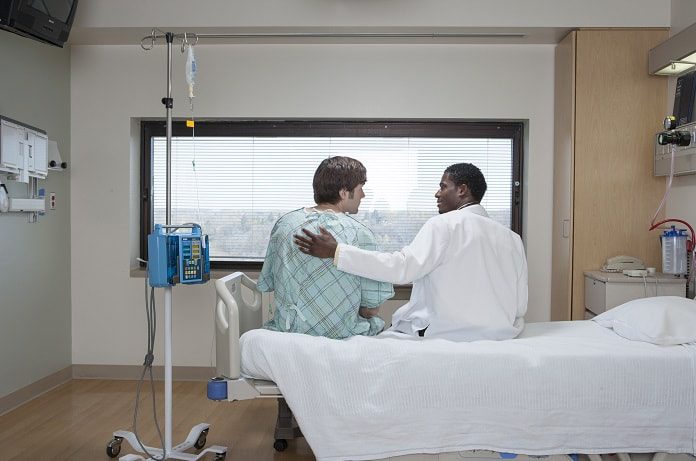Long-term androgen deprivation therapy (ADT) in combination with abiraterone, a selective inhibitor of CYP17, an enzyme needed for androgen production, is associated with significantly higher rates of overall and failure-free survival than ADT alone among men with locally advanced or metastatic prostate cancer.
Cancer of the prostate is the most prevalent disease in men, with an estimated 180,890 new cases accounting for 21% of all cancer diagnosis in 2016(1). Since the early 40s, androgen deprivation therapy (ADT) has been an indispensable weapon in the fight against prostate cancer, significantly delaying cancer progression(2). Advanced prostate cancer is initially treated with hormonal therapy; however, prospective clinical studies (CHAARTED and STAMPEDE studies) have shown that hormonal therapy combined with docetaxel resulted in survival rates of 57.6 and 60 months, respectively, compared to 44 and 45 months with hormonal therapy alone (3). A combination of abiraterone acetate and androgen deprivation therapy (ADT) resulted in effective androgen depletion which was more potent than that induced by surgical castration or by gonadotropin releasing hormone. In fact, survival among men with castration-resistant prostate cancer was increased by combining abiraterone acetate with prednisolone. The STAMPEDE trial investigated whether prior use of abiraterone in men who are initiating ADT could improve survival. A total of 1917 patients from 111 sites in the UK and Switzerland were randomized 1:1 to ADT alone and combination therapy (4).
Results of the study overwhelmingly favored combination, which resulted in184 deaths compared to 262 in the ADT-alone group (4). The three-year survival was 83% in the combination therapy compared to 76% in the ADT-alone group. Further, when failure of treatment demonstrated through radiologic, clinical, prostate specific antigen progression or death from prostate cancer was evaluated, there were 248 events in the combination group versus 535 in the ADT-alone group. In addition, there was 71% relative improvement in the time to treatment failure which led to a 37% difference in overall survival between groups, favoring combination therapy. Nevertheless, when grade ≥ 3 adverse events were recorded, patients who received the combination therapy reported 47% adverse effects (AEs) whereas those in the ADT-alone group reported only 33% AEs (4).
An important concern with ADT is the cost of treating patients. In a Canadian study that examined 21,811 patients with no pre-ADT, 50% developed 1 or more AEs after ADT. The costliest AE was stroke ($26,432/year). Costs were highest in the first month after diagnosis (from $1,714 for diabetes to $14,068 for myocardial infarction). Costs decreased within 18 months, ranging from $784 per 30 days (diabetes) to $1,852 per 30 days (stroke). AEs increased the costs of ADT by 265%(5).
Therefore, further analysis weighing the benefits of ADT with the related AE concerns is needed so health care systems can evaluate their potential and application.
Written by Joseph M. Antony, PhD
Reference List
- Siegel RL, Miller KD, Jemal A. Cancer statistics, 2016. CA Cancer J Clin 2016;66:7-30.
- Huggins C, Hodges CV. Studies on prostatic cancer. I. The effect of castration, of estrogen and of androgen injection on serum phosphatases in metastatic carcinoma of the prostate. 1941. J Urol 2002;167:948-51.
- Chemohormonal therapy in metastatic hormone-sensitive prostate cancer. Sweeney CJ, Chen YH, Carducci M, Liu G, Jarrard DF, Eisenberger M, Wong YN, Hahn N, Kohli M, Cooney MM, Dreicer R, Vogelzang NJ, Picus J, Shevrin D, Hussain M, Garcia JA, DiPaola RS.. Urol Oncol 2017;35:123.
- James ND, de Bono JS, Spears MR et al. Abiraterone for Prostate Cancer Not Previously Treated with Hormone Therapy. N Engl J Med 2017.
- Krahn MD, Bremner KE, Luo J, Alibhai SM. Health care costs for prostate cancer patients receiving androgen deprivation therapy: treatment and adverse events. Curr Oncol 2014;21:e457-e465.



